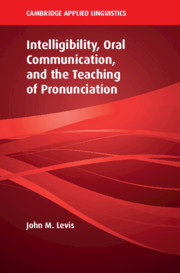Book contents
- Intelligibility, Oral Communication, and the Teaching of Pronunciation
- The Cambridge Applied Linguistics Series
- Intelligibility, Oral Communication, and the Teaching of Pronunciation
- Copyright page
- Contents
- Figures
- Tables
- Series Editors’ Preface
- Author’s Preface
- Abbreviations
- Introduction
- Part I A Framework for the Teaching of Spoken Language
- Part II Word-Based Errors and Intelligibility
- 3 Segmentals and Intelligibility
- 4 Consonant Clusters and Intelligibility
- 5 Word Stress and Intelligibility
- Part III Discourse-Based Errors and Intelligibility
- Part IV Teaching and Research Approaches to Intelligibility
- References
- Index
5 - Word Stress and Intelligibility
from Part II - Word-Based Errors and Intelligibility
Published online by Cambridge University Press: 24 September 2018
- Intelligibility, Oral Communication, and the Teaching of Pronunciation
- The Cambridge Applied Linguistics Series
- Intelligibility, Oral Communication, and the Teaching of Pronunciation
- Copyright page
- Contents
- Figures
- Tables
- Series Editors’ Preface
- Author’s Preface
- Abbreviations
- Introduction
- Part I A Framework for the Teaching of Spoken Language
- Part II Word-Based Errors and Intelligibility
- 3 Segmentals and Intelligibility
- 4 Consonant Clusters and Intelligibility
- 5 Word Stress and Intelligibility
- Part III Discourse-Based Errors and Intelligibility
- Part IV Teaching and Research Approaches to Intelligibility
- References
- Index
Summary
- Type
- Chapter
- Information
- Publisher: Cambridge University PressPrint publication year: 2018



